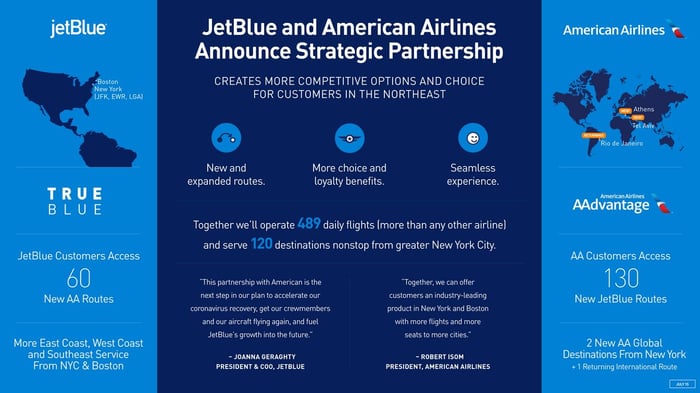Last year, American Airlines (AAL -0.51%) and JetBlue Airways (JBLU 4.05%) announced a unique agreement to cooperate in the New York and Boston markets in order to compete more effectively with key rivals Delta Air Lines (DAL 0.39%) and United Airlines.
The U.S. Department of Transportation approved the arrangement (with certain conditions) in January. As a result, American and JetBlue have begun to implement their new partnership this year. However, on Tuesday, the U.S. Department of Justice and several states sued American Airlines and JetBlue on antitrust grounds. Let's see what this development means for both airlines.
What the alliance does
Today, Delta Air Lines and United Airlines dominate the New York market. While JetBlue has a base at JFK International Airport and American has small hubs at JFK and LaGuardia Airports, neither airline has nearly as many slots as Delta or United. That makes it difficult to compete. For example, American Airlines can't offer enough connecting flight options to offer a wide slate of international flights from New York. Meanwhile, significant holes in JetBlue's route network make it hard for the carrier to compete for corporate contracts.
In Boston, JetBlue is the market leader, with a 33% share of domestic traffic in 2019. But even there, Delta has been able to gain market share -- particularly among business travelers -- by complementing its nonstop offerings with a broad domestic and global route network that offers plentiful connecting opportunities. American has struggled even more, steadily losing share to both Delta and JetBlue.

Image source: JetBlue Airways.
The Northeast Alliance calls for American Airlines and JetBlue to coordinate route planning and scheduling (but not fares) and codeshare on a wide array of routes touching New York and Boston. Additionally, they are offering reciprocal frequent-flyer benefits to encourage customers to fly both airlines. Finally, American is giving JetBlue access to numerous slots at LaGuardia and JFK that it has struggled to use productively and profitably, enabling JetBlue to expand there.
To align their financial incentives, JetBlue and American Airlines will pool their revenues in the markets covered by the alliance, such that each airline earns the same revenue no matter which of the two airlines operates a customer's flight.
The DOJ objects
This week, the DOJ and several states sued American and JetBlue. They allege that the new Northeast Alliance is anticompetitive (in violation of the Sherman Antitrust Act) and want to unwind it. The federal government and states believe the agreement essentially removes JetBlue as an aggressive, independent low-fare carrier that imposes price discipline on rivals.
Specifically, the complaint argues that while JetBlue and American have agreed not to talk to each other about pricing, they can still boost fares by coordinating to reduce the number of seats they offer. The DOJ highlights 11 nonstop markets from Boston, 17 nonstop markets from New York, and 98 connecting markets where a hypothetical JetBlue-American Airlines combination would significantly increase market concentration, making it "presumptively anticompetitive."

Image source: American Airlines.
Top DOJ antitrust lawyers have met with JetBlue and American Airlines officials, according to The Wall Street Journal, but they were unable to reach an agreement that would avoid litigation.
A shaky case
Not surprisingly, American Airlines and JetBlue executives have forcefully defended the Northeast Alliance. JetBlue said it plans to add roughly 100 daily roundtrips from the three major New York airports relative to 2019. Most of that growth would have been impossible without the American Airlines alliance due to slot and gate constraints. It also intends to add dozens of new flights in Boston.
For its part, American Airlines noted that the alliance partners have already added 58 new routes and increased service on more than 130 others. CEO Doug Parker also highlighted the inability of either American or JetBlue to compete effectively with Delta and United in New York on a stand-alone basis.
Indeed, the antitrust case against the Northeast Alliance rests on shaky ground. While the arrangement would lead to less competition on certain routes, it will increase competition on many others, due to JetBlue's expansion plans and American's international growth. The DOJ argues that the airlines could grow without a revenue-sharing alliance -- but doesn't make a convincing argument that they would actually do so.

Image source: American Airlines and JetBlue Airways.
The complaint also underestimates other airlines' ability to insert new competition into markets where JetBlue and American Airlines might reduce capacity. Finally, recent history doesn't support the DOJ's contention that the alliance will have a chilling effect on competition. Over the past year, JetBlue has launched flights to Miami and expanded dramatically in Los Angeles, both of which are American Airlines hubs.
What does it mean for investors?
Although the DOJ faces an uphill climb to prove that the Northeast Alliance is illegal, investors must nevertheless prepare for the possibility that American and JetBlue will lose in court. The airlines also might offer new concessions to settle the case.
If the government successfully blocks the alliance, it will disproportionately hurt American Airlines. JetBlue would miss out on growth opportunities in New York and it would have to fight harder for customers, but the carrier would be able to continue its organic growth in Boston.
By contrast, without the JetBlue deal, debt-laden American Airlines will face an unappealing choice between shrinking further in key Northeast markets and ramping up service on routes where it is unlikely to make money. Thus, American has much more at stake in this fight.





